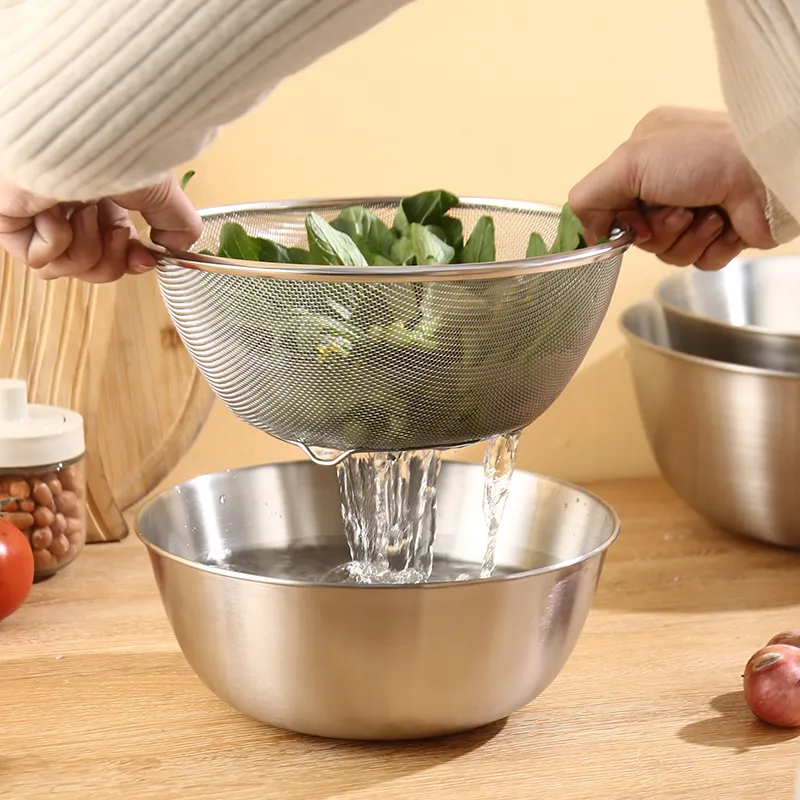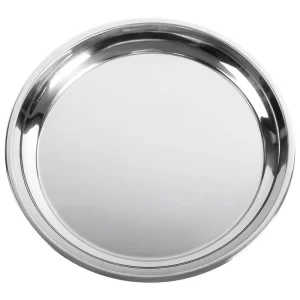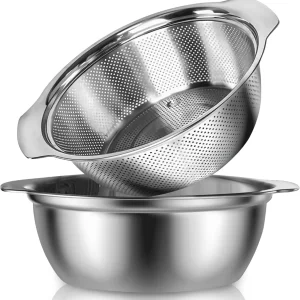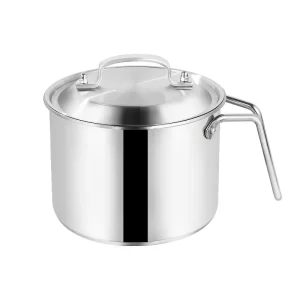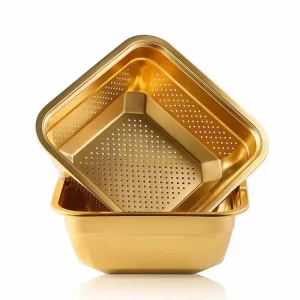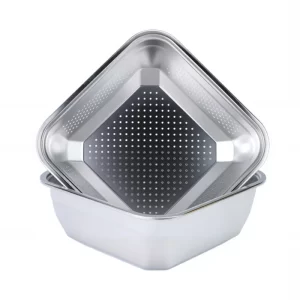Introduction
Mixing bowls are a kitchen essential in every contemporary kitchen, both commercial and residential. Mixing bowls are an indispensable tool, from baking cakes to preparing salads and marinating ingredients. Stainless steel mixing bowls have particularly gained popularity as they are lightweight, yet durable, and easy to clean. In spite of that, most consumers are still wondering: Are stainless steel mixing bowls safe? Will they endanger food safety? In this post, we will cover stainless steel mixing bowls’ safety, usage, maintenance, and compare them to other materials to inform and use this daily kitchenware correctly.
Why Use Stainless Steel Mixing Bowls?
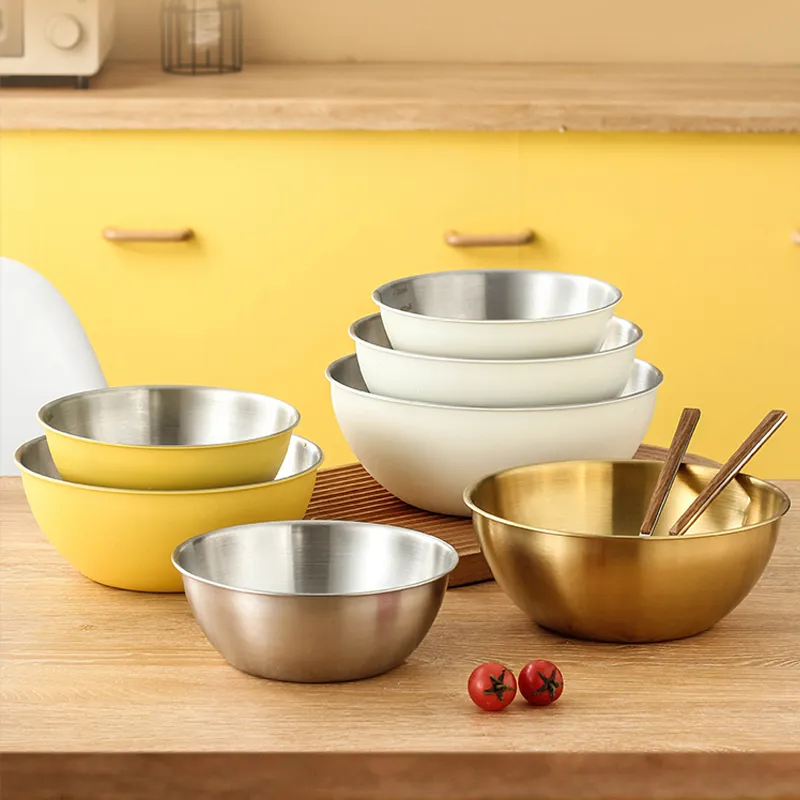
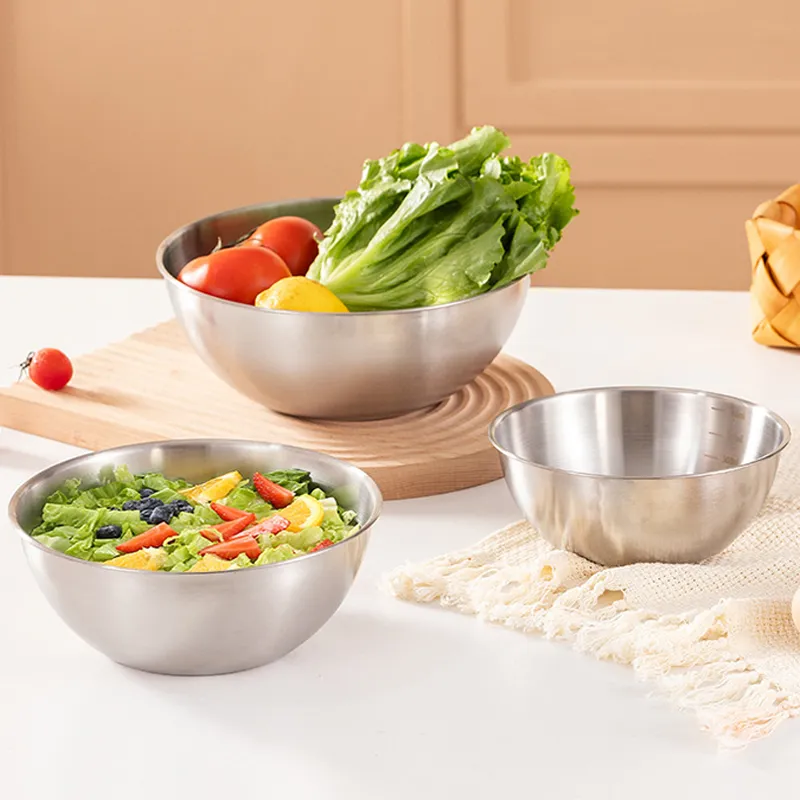
Various materials for mixing bowls are found in the market, including glass, ceramic, plastic, and stainless steel. Stainless steel is currently the preferred option for the majority of chefs and home cooks due to its specific advantages.
Durability and Lightweightness
Stainless steel mixing bowls are very impact-resistant and will not easily break or crack. Stainless steel mixing bowls are lighter in weight than heavy glass bowls, hence easier to handle and store.
Hygiene and Safety
The smooth surface of the stainless steel prevents food residue from adhering, making cleaning a breeze. This greatly reduces the chances of bacterial growth. Stainless steel does not leach toxic chemicals upon coming into contact with hot heat or acidic food, unlike plastic bowls.
Cost-Effectiveness
While slightly more expensive, some of the top-of-the-range stainless steel mixing bowls are more economical in the long run as they last longer. For example, a good set of stainless steel mixing bowls can last decades before needing replacement.
Safety Analysis of Stainless Steel Mixing Bowls
Most people wonder: can health be affected by long use of stainless steel mixing bowls? The answer is, as long as you choose food-grade stainless steel and use it properly, they are safe.
The Importance of Food-Grade Stainless Steel
Food-grade stainless steel (such as 304 or 316) is rigorously tested and meets food safety standards. These stainless steel bowls will not leach toxic chemicals when they react with high heat, acidic, or alkaline foods. For example, acidic foods like tomatoes or lemon juice in stainless steel mixing bowls will not impart taste or safety. ### Heat Resistance and Corrosion Resistance
Stainless steel is heat-resistant and can be utilized for cooking or dishwasher cleaning. It is resistant to corrosion and, as a result, will not readily rust even if utilized in humid or acidic environments.
Usage Precautions
Avoid storing food in stainless steel bowls for an extended period, especially foods containing high salt or acid levels. Stainless steel mixing bowls are durable and safe, but prolonged soaking may affect their luster. The correct usage involves short-term food preparation, timely transfer, and proper cleaning.
How Stainless Steel Compares to Other Types of Mixing Bowls
To better understand the advantages of stainless steel bowls, let us compare them with other common types.
Glass Mixing Bowls
Glass bowls are transparent and good-looking, and it is easy to view ingredients. They are brittle and heavy and cannot handle vigorous mixing. Glass bowls are not as durable in the culinary world as stainless steel mixing bowls.
Plastic Mixing Bowls
Plastic bowls are inexpensive and lightweight, but long exposure to high temperatures or acidic foods can cause toxic chemicals to leach. Furthermore, plastic bowls scratch easily and provide a breeding ground for bacteria. Stainless steel bowls are safer and longer-lasting.
Ceramic Mixing Bowls
Ceramic bowls are attractive but heavy and brittle, and less suitable for frequent use. For efficiency-minded kitchens, stainless steel mixing bowls are clearly more practical.
Stainless Steel Mixing Bowls: Practical Tips and Care
Proper use and maintenance extend the lifespan of stainless steel mixing bowls and maintain their shine.
Usage Tips
- Avoid using hard metal utensils with stainless steel bowls to prevent scratching.
- Stainless steel mixing bowls can be used with electric mixers or hand mixers when baking to provide enough weight-bearing and stability.
- Refrigeration can be achieved through the rapid cooling of the bowl to preserve food freshness.
Cleaning and Maintenance
- Clean with warm water and gentle soap to remove food residues.
- Avoid using abrasive cleaning tools like steel wool that scratch.
- Regularly polish to maintain stainless steel mixing bowls’ shine. ### Real-World Example
In a food service supply company, chefs utilize stainless steel mixing bowls daily to combine enormous quantities of ingredients. When properly cleaned and maintained, the bowls remain in new condition after over 10 years of daily use—far longer than glass or plastic bowls.
Applications of Stainless Steel Mixing Bowls in the Food Service Industry
Aside from home kitchens, stainless steel mixing bowls find widespread application in the food service industry.
Restaurants and Hotels
In restaurants, stainless steel mixing bowls are generally used to prepare enormous quantities of salads or to marinate meat. They are lightweight and sturdy, allowing chefs to work efficiently.
Bakeries and Patisseries
In bakeries, stainless steel bowls are often used to beat egg whites or cream. Stainless steel won’t affect the structure of the proteins and permits flawless whipping results.
Food Service Wholesalers and Suppliers
As a popular choice for wholesale purchasing, stainless steel mixing bowls meet the needs of food service wholesale business for efficiency, safety, and durability. The wholesalers tend to purchase in bulk to maintain uninterrupted production and consistent quality.
Conclusion
In summary, stainless steel mixing bowls are not only safe but also superior to any other material in terms of durability, hygiene, and versatility. Choosing food-grade stainless steel bowls, using and maintaining them well ensures their safety for application in both home and commercial kitchens. As a consumer, you can choose stainless steel mixing bowls with confidence; they will be your faithful friend in cooking and baking.
About Yongyu
Yongyu is a professional Best Kitchenware Manufacturer and Catering Supplies Wholesaler, specializing in producing and selling good quality kitchenware. We offer various customized products, like stainless steel mixing bowls, to meet the various needs of home kitchens, restaurants, and wholesale customers. With nice quality control and good after-sales service, Yongyu has won the trust of international customers.
Frequently Asked Questions (FAQ)
1. Will stainless steel mixing bowls rust?
If you opt for food-grade stainless steel and clean and store it appropriately, it will not rust.
2. Can stainless steel mixing bowls be put in the dishwasher?
Yes, most stainless steel mixing bowls are dishwasher-safe, simple, and easy to clean.
3. Is whipping egg whites in stainless steel mixing bowls suitable?
That’s a great idea. Stainless steel bowls won’t affect the whipping of egg whites, and they’re a baking staple.
4. Are stainless steel mixing bowls safer than glass bowls?
Stainless steel bowls are safer than glass bowls in terms of resistance to breakage, durability, and high-temperature use.

Purchasing Manager, USA
“We ordered a large batch of stainless steel mixing bowls from Yongyu. The quality is excellent, very durable, and easy to clean. ”
John M.

